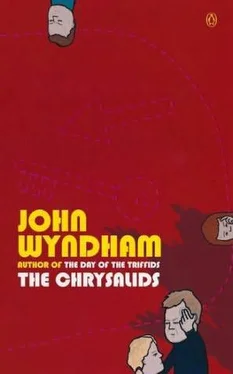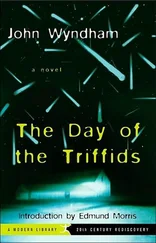‘Never — not anybody at all,’ I assured her earnestly.
‘It’s very, very important,’ she insisted. ‘How can I explain to you?’ But she didn’t really need to explain. Her urgent, tight-strung feeling of the importance was very plain. Her words were far less potent. She said:
‘If anyone were to find out, they’d — they’d be terribly unkind to her. We’ve got to see that that never happens.’
It was as if the anxious feeling had turned into something hard, like an iron rod.
‘Because she has six toes?’ I asked.
‘Yes. That’s what nobody but us must ever know. It must be a secret between us,’ she repeated, driving it home. ‘You’ll promise, David?’
‘I’ll promise. I can swear, if you like,’ I offered.
‘The promise is enough,’ she told me.
It was so heavy a promise that I was quite resolved to keep it completely — even from my cousin, Rosalind. Though, underneath, I was puzzled by its evident importance. It seemed a very small toe to cause such a degree of anxiety. But there was often a great deal of grown-up fuss that seemed disproportionate to causes. So I held on to the main point — the need for secrecy.
Sophie’s mother kept on looking at me with a sad but unseeing expression until I became uncomfortable. She noticed when I fidgeted, and smiled. It was a kind smile.
‘All right, then,’ she said. ‘We’ll keep it secret, and never talk about it again?’
‘Yes,’ I agreed.
On the way down the path from the door, I turned round.
‘May I come and see Sophie again soon?’ I asked.
She hesitated, giving the question some thought, then she said:
‘Very well — but only if you are sure you can come without anyone knowing,’ she agreed.
Not until I had reached the bank and was making my homeward way along the top of it did the monotonous Sunday precepts join up with reality. Then they did it with a click that was almost audible. The Definition of Man recited itself in my head: ‘… and each leg shall be jointed twice and have one foot, and each foot five toes, and each toe shall end with a flat nail….’ And so on, until finally: ‘And any creature that shall seem to be human, but is not formed thus is not human. It is neither man nor woman. It is a blasphemy against the true Image of God, and hateful in the sight of God.’
I was abruptly perturbed — and considerably puzzled, too. A blasphemy was, as had been impressed upon me often enough, a frightful thing. Yet there was nothing frightful about Sophie. She was simply an ordinary little girl — if a great deal more sensible and braver than most. Yet, according to the Definition…
Clearly there must be a mistake somewhere. Surely having one very small toe extra — well, two very small toes, because I supposed there would be one to match on the other foot — surely that couldn’t be enough to make her ‘hateful in the sight of God…’?
The ways of the world were very puzzling….
Ireached home by my usual method. At a point where the woods had lapped up the side of the bank and grown across it I scrambled down on to a narrow, little-used track. From there on I was watchful, and kept my hand on my knife. I was supposed to keep out of the woods, for it did occasionally — though very rarely — happen that large creatures penetrated as far into civilized parts as Waknuk, and there was just a chance that one might encounter some kind of wild dog or cat. However, and as usual, the only creatures I heard were small ones, hurriedly making off.
After a mile or so I reached cultivated land, with the house in sight across three or four fields. I worked along the fringe of the woods, observing carefully from cover, then crossed all but the last field in the shadows of the hedges, and paused to prospect again. There was no one in sight but old Jacob slowly shovelling muck in the yard. When his back was safely turned I cut swiftly across the bit of open ground, climbed in through a window, and made my way cautiously to my own room.
Our house is not easy to describe. Since my grandfather, Elias Strorm, built the first part of it, over fifty years earlier, it had grown new rooms and extensions at various times. By now it rambled off on one side into stock-sheds, stores, stables, and barns, and on the other into wash-houses, dairies, cheese-rooms, farm-hands’ rooms, and so on until it three-quarters enclosed a large, beaten-earth yard which lay to leeward of the main house and had a midden for its central feature.
Like all the houses of the district, it was constructed on a frame of solid, roughly-dressed timbers, but, since it was the oldest house there, most of the spaces in the outer walls had been filled in with bricks and stones from the ruins of some of the Old People’s buildings, and plastered wattle was used only for the internal walls.
My grandfather, in the aspect he wore when presented to me by my father, appeared to have been a man of somewhat tediously unrelieved virtue. It was only later that I pieced together a portrait that was more credible, if less creditable.
Elias Strorm came from the East, somewhere near the sea. Why he came is not quite clear. He himself maintained that it was the ungodly ways of the East which drove him to search for a less sophisticated, stauncher-minded region; though I have heard it suggested that there came a point when his native parts refused to tolerate him any longer. Whatever the cause, it persuaded him to Waknuk — then undeveloped, almost frontier country — with all his worldly goods in a train of six wagons, at the age of forty-five. He was a husky man, a dominating man, and a man fierce for rectitude. He had eyes that could flash with evangelical fire beneath bushy brows. Respect for God was frequently on his lips, and fear of the devil constantly in his heart, and it seems to have been hard to say which inspired him the more.
Soon after he had started the house he went off on a journey and brought back a bride. She was shy, pretty in the pink and golden way, and twenty-five years younger than himself. She moved, I have been told, like a lovely colt when she thought herself unwatched; as timorously as a rabbit when she felt her husband’s eye upon her.
All her answers, poor thing, were dusty. She did not find that a marriage service generated love; she did not enable her husband to recapture his youth through hers; nor could she compensate for that by running his home in the manner of an experienced housekeeper.
Elias was not a man to let shortcomings pass unremarked. In a few seasons he straitened the coltishness with admonitions, faded the pink and gold with preaching, and produced a sad, grey wraith of wifehood who died, unprotesting, a year after her second son was born.
Grandfather Elias had never a moment’s doubt of the proper pattern for his heir. My father’s faith was bred into his bones, his principles were his sinews, and both responded to a mind richly stored with examples from the Bible, and from Nicholson’s Repentances. In faith father and son were at one; the difference between them was only in approach; the evangelical flash did not appear in my father’s eye; his virtue was inure legalistic.
Joseph Strorm, my father, did not marry until Elias was dead, and when he did he was not a man to repeat his father’s mistake. My mother’s views harmonized with his own. She had a strong sense of duty, and never doubted where it lay.
Our district, and, consequently, our house as the first there, was called Waknuk because of a tradition that there had been a place of that name there, or thereabouts, long, long ago, in the time of the Old People. The tradition was, as usual, vague, but certainly there had been some buildings of some kind, for the remnants and foundations had remained until they were taken for new buildings. There was also the long bank, running away until it reached the hills and the huge scar that must have been made by the Old People when, in their superhuman fashion, they had cut away half a mountain in order to find something or other that interested them. The place may have been called Waknuk then; anyway, Waknuk it had become; an orderly, law-abiding, God-respecting community of some hundred scattered holdings, large and small.
Читать дальше












